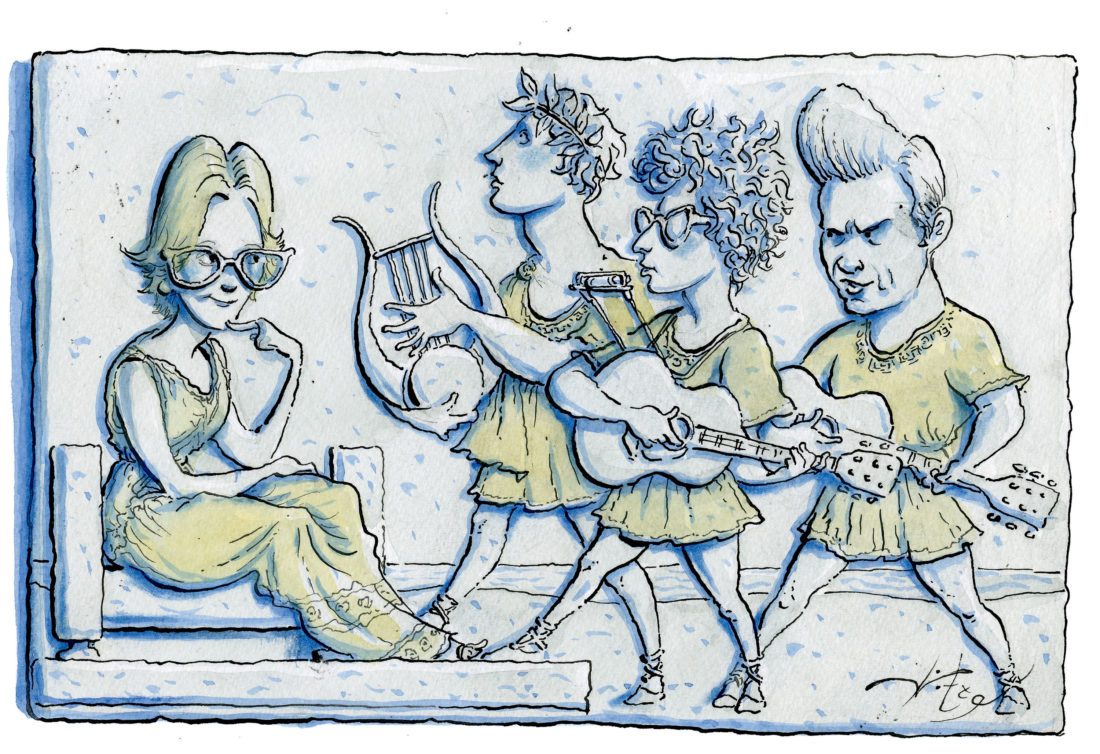As devoted readers of this space know, I am a sucker for a singer. Not long ago, I discovered a YouTube clip of two of the greatest vocalists in the history of the world—that would be Frank Sinatra and Elvis Presley—performing in a 1960 Timex TV special, and I have watched it at least five hundred times. (If you’ve not yet seen this particular piece of perfection, here it is.) In a bit of role switching, Elvis is singing “Witchcraft” and Frank is singing “Love Me Tender,” and they are both so sexy and so on top of their games and just so damn good it’s ridiculous. Then, of course, there’s the way they move—or as Frank puts it, “We work in the same way…only in different areas.”
Those two were not just phenomenal singers but also unparalleled entertainers, commanding the rapt attention of millions around the globe. And while I love a good show—who could possibly be immune to the charms of, say, Jerry Lee setting fire to his piano?—I am equally awed by a slightly less flamboyant approach. James Taylor (whom I saw for maybe the tenth time last summer) was my first “boyfriend.” If I’d been in charge, Dylan would’ve been given the Nobel Prize a couple of decades ago. Give me a man (or a woman) with a story and a guitar and I’m a goner.
So it was that I was wrapped in as many layers as I had brought with me to the Gulf coast of Florida (not nearly enough), waiting for James McMurtry to turn up at an outdoor venue during January’s 30A Songwriters Festival. It was 8:00 p.m. and barely a few degrees above freezing, a situation not remotely remedied by the sparsely spaced heat lamps. Just a few hours earlier a valiant Emmylou Harris, who performed in an open field as part of the same four-day event, had been forced to quit because her fingers could not feel her guitar strings.
My own fingers were so numb I could barely hold the plastic cup of five-dollar red wine that fortified me and my fellow diehards, but I was determined. For one thing, I was fairly sure McMurtry would play “You Got to Me,” a tale about the one that got away that is bring-you-to-your-knees romantic without being the least bit maudlin. McMurtry once told an interviewer that it took him almost twenty years to write the song, that he’d “finally got to the point” where he could sing it “without cringing.” He added: “If you can do that, it means there’s no bullshit, no filler.”
Those are the words of an editor and writer with uncommon gifts, but you could make the case that McMurtry comes by his narrative rigor naturally—his mother, Jo Scott McMurtry, is a former English professor specializing in Shakespeare and his father is the Pulitzer-winning author Larry McMurtry. No less a storyteller than Stephen King called him the “truest, fiercest songwriter of his generation,” and, like King, he mostly tells tales in other people’s voices. “My goal is to write the best song,” McMurtry says, “and usually the best way to do that is to stay in character.” He also knows how to get your attention. The opening line of “Copper Canteen” (from Complicated Game) is “Honey, don’t you be yelling at me when I’m cleaning my gun,” but it’s not a gimmick. By the time the song (narrated by a deer hunter and unrepentant but only occasional rogue) is done, McMurtry has painted a surprisingly tender portrait of a man and a marriage and a life that most novelists would envy—all in less than five minutes.
McMurtry went to boarding school at Woodberry Forest in Virginia, where his roommate turned him on to John Prine, another of the great storytellers. Not surprisingly, McMurtry cites Prine as a serious influence, along with Kris Kristofferson, whom his mother took him to see when he was nine. I wasn’t much older than that when I first saw Prine, at the Greenville (Mississippi) High School auditorium, a place in which he turned up via a bit of subterfuge on the part of my friend and mentor the late Kenneth Haxton, who was then head of the Greenville Symphony Orchestra. Though Kenneth was a classical composer and a cellist (among his many other talents, including crafting crossword puzzles for the New York Times), he was also a big early Prine fan and slipped him into the symphony’s fall lineup. On the night of the show, the old ladies arrived in chiffon evening dresses and mink stoles, clutching their season tickets and expecting an opera singer of some note or maybe a violinist. Instead, they got a scruffy guy on a wooden stool picking a guitar and singing about the “hole in Daddy’s arm where all the money goes.” When Prine got to the part in that same song, “Sam Stone,” about Jesus Christ dying “for nothing, I suppose,” my Baptist neighbor, apparently not tuned in to the concepts of narration or nuance, or even compassion, arose with his entire family and departed.
Prine’s stories can be almost unbearably sad, but he sings some funnies too, including “The Accident,” an account of a very minor wreck involving “Mrs. Tom Walker and her beautiful daughter Pamela,” who was driving the car. Whenever my friend Ralph McGee plays it in our living room, which is thankfully pretty often, my father insists on referring to it as the “minority rape song,” mainly because he can’t ever remember the name (it’s even got a subtitle, “Things Could Be Worse”) but also because he has as much of a sense of humor as Prine. In the chorus it is point-
ed out that, all things considered, the ladies are lucky: “They could have run into that tree/Got struck by a bolt of lightning/And raped by a minority.” It goes without saying that the last option would’ve been the biggest fear of a girl like Pamela and her upright mama, and Prine’s subtle lampooning of that fact never fails to elicit howls in my house.
McMurtry too is a funny guy. When an interviewer once rather earnestly inquired if he viewed the glass as half full or half empty, he replied that he just wondered if it contained water or vodka. Another time, when he was asked what it was like growing up with such a famous father, he explained that his dad had not gained much fame until after he was grown. He then launched into a story about the elder McMurtry checking into a Holiday Inn in a small town in Texas where he’d come to deliver a round of college lectures. The motel marquee welcomed “Larry McMurtry, Author of Terms of Endearment,” which gratified him so much he bought a disposable camera and took a picture. The next morning, he found out that he’d won the Pulitzer Prize for Lonesome Dove, so when he walked outside and saw a fellow on a ladder messing with the sign’s black lettering, he figured it would soon reflect the news. Instead, it read, “Lunch Special, Catfish $4.99.”
Now, “4.99 Catfish” is actually not a bad song title, but then there’s no end to good titles or material when you’re writing about life its ownself. Singers have been telling stories—charming the hell out of us, moving us to tears, making us laugh out loud, documenting our deeds—since Orpheus first picked up his lyre. Some stories, of course, are better than others. Gordon Lightfoot’s “The Wreck of the Edmund Fitzgerald” goes on for so long I never fail to wish I’d gone down with the ship. Despite the temperature, McMurtry managed to dazzle that night in Grayton Beach as we all watched our breath cloud in front of us. At one point, he encouraged folks to dance, saying something like, “It’s freezing out here, people, life is short, get up and move.” Most folks did, and as I watched them I was reminded of the power of narrative to warm cold hearts and bodies, to make connections and remind us we are all in this together. What follows is a tiny handful of some of the best stories I know.
“Song for a Deck Hand’s Daughter”
James McMurtry
In 1989 John Mellencamp coproduced McMurtry’s first album, Too Long in the Wasteland, and it’s packed with the kinds of gems that have marked his career ever since. My favorite is this one, not least because I know these people and these places: “Memphis town,” Baton Rouge, Cape Girardeau. No matter what world he inhabits, McMurtry’s details are always on the money and never a word is wasted.
“The Great Compromise”
John Prine
Prine’s long list of masterpieces includes “Hello in There,” “Donald and Lydia,” and “Angel from Montgomery.” But I have to go with “Compromise” because the narrator, left by a gorgeous girl at the drive-in (“It was there that I first suspected/That she was doing what she’d already done”), gets me every time. The woman is a metaphor for the good old U.S. of A., and her disillusioned lover’s heartbreak is all the more powerful because Prine makes it personal.
“A Boy Named Sue”
Johnny Cash
Cash was partial to a good story (“Wreck of
the Old ’97” comes to mind) and to good
storytellers too. The author of this Grammy-
winning tune, Shel Silverstein, is perhaps best known for his children’s book The Giving Tree, and I have to admit that the novelty of “Sue” made it one of my favorites as a child. Silverstein wrote other songs too, including “The Ballad of Lucy Jordan” (which chronicles the disillusion of a sub-
urban housewife), but for the title alone, I have to give it to him for his anti-VD song, “Don’t Give a Dose to the One You Love Most.”
“Lily, Rosemary and the Jack of Hearts”
Bob Dylan
Every song Dylan writes is a story, but occasionally he comes through with a full-on historical ballad as in “The Lonesome Death of Hattie Carroll” (about the death of an African American barmaid at the hands of the scion of a tobacco fortune) and “Hurricane” (about the wrongful conviction of the boxer Rubin “Hurricane” Carter for murder). The latter proves yet again the power of narrative—the song ultimately had a hand in getting Carter released—but I’m especially partial to Dylan’s historical fiction, found on one of the world’s most perfect albums, Blood on the Tracks. “Lily” is complicated, romantic, chock-full of characters, and cinematic. There’s a reason two screenplays have been based on the song, but really, all you’ve got to do is listen.
“Sunday Morning Coming Down”
Kris Kristofferson
Few among us have never been afflicted with a crippling Sunday morning hangover, but no one other than the genius Kristofferson could make poetry out of it.
“You Got to Me”
James McMurtry
This one got to me so hard I had to pull my car over the first time I heard it. As tight as a drum and further proof of McMurtry’s stellar craftsmanship, it’s layered with fine details, from a limo that smells like “cocaine sweat” to a curious paperboy and the ever-alluring “tangle of skin on skin.” It’s also got the not insignificant bonuses of the great Benmont Tench (a founding member of Tom Petty and the Heartbreakers) on keyboards and Ivan Neville on backup vocals. But the lyrics are the thing: “You got to me/Brought all this empty down on top of me/I didn’t know that we were not to be/But I know a thing or two now.” Don’t we all.








